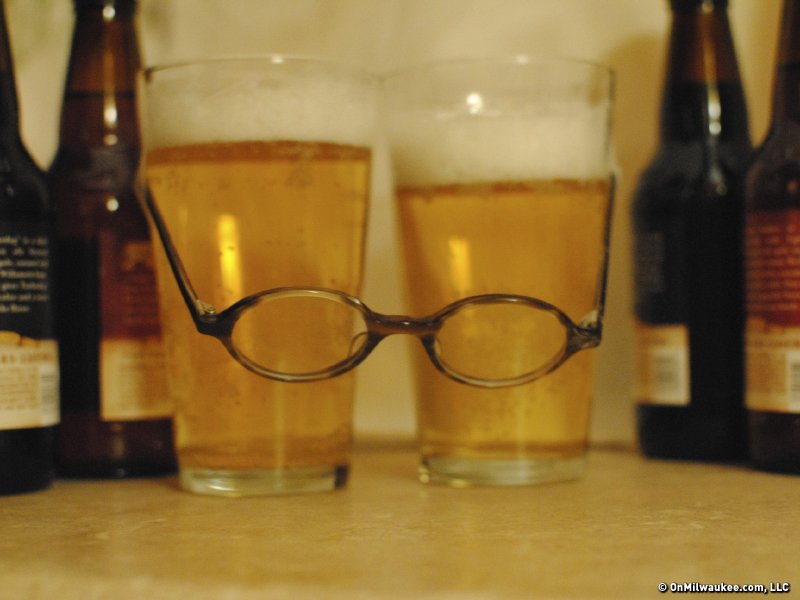"Bar Month" at OnMilwaukee.com – brought to you by Hornitos, OR-G, Party Armor, Red Stag, Absolut, Fireball and Malibu – is back for another round! The whole month of February, we're serving up intoxicatingly fun articles on bars and clubs – including guides, the latest trends, bar reviews and more. Grab a designated driver and dive in!
The folklore surrounding the relationship between drinking and people's attractiveness is well known. One social phenomenon that speaks to this relationship, most commonly referred to as the "beer goggles effect," causes people to appear more and more attractive to a drinker with every sip.
Many tales involve someone ending up going home with an erroneously perceived hottie that they might not otherwise – and regretting it in the morning.
How do beer goggles work? Is it simply that inhibitions are loosened after a few drinks? Or is it that alcohol causes people to be perceived as more attractive?
Scientists have been exploring these perplexing questions, at least since 1979, when researchers determined that something they call "attractiveness ratings" did in fact rise among both genders in a bar setting – especially at closing time.
Scientists measure attractiveness in different ways. For some researchers, an attractiveness rating is how the drinker perceives symmetry in another's face. The less symmetrical the facial features, the less attractive the person would rate. What they found is that alcohol messes with the drinker's ability to note symmetry. Others believe that alcohol actually stimulates the nucleus accumbens, a part of the brain purportedly responsible for measuring a human face's attractiveness.
One recent beer goggles study by researchers at Bond University in Australia used faces of real people from Lavalife.com – "Where singles click" – and where Australians are less likely to have seen the faces before.
Participants were given breathalyzer tests and asked to rate the Lavalife faces on a scale of one to 10. They were divided into three groups, not-intoxicated, moderately intoxicated or severely intoxicated; the drunker two groups scored the images at a higher rate.
The research concluded that, as expected, alcohol may increase perceptions of attractiveness. It also found that alcohol by no means influenced whether anyone was actually going home with anybody, but did suggest that drinkers are inclined to at least talk and act like they would "hit that."
Louis Seno, a physician at Aurora Healthcare in Mequon, questions all the physiology of these tests.
"Rather than other people somehow starting to look better, you're just more relaxed with alcohol," he says.
Seno likens the effects of alcohol to entering a "reality distortion field," a term first coined to describe how Apple co-founder Steve Jobs used his charisma to bend others' will to suit his needs.
If alcohol creates a reality distortion field, must it impact a person's judgment, which has been a long-presumed effect of alcohol?
"Without question this lack in proper judgment can be attributed to over indulging in your intoxicant of choice," says Paul Kennedy, who tends bar at Tonic, 2335 S. Kinnickinnic Ave. "The entire truth is that it is not just physical attraction that comes into play, after all beauty is in the eye of the beholder, but a lowering of standards in every area."
But both the science and the lore may actually cover a more interesting reality about what happens when we don the goggles.
Scientists seem more interested in examining how alcohol contributes to questionable behavior, often depicting how wearing beer goggles may lead to "risky sex." The folk wisdom of alcohol-use, which is of course more positive, still only manages to muster tales of how a little "liquid courage" got people through a tough moment.
The reality might be that alcohol gives us a moment to break out of our judgments, to see the possibilities of our humanity.
A recent study at the University of Bristol found that beer goggles not only increased the attractiveness ratings of the opposite gender among drinkers, but of the same gender as well. A shout-out to the queer in all of us, perhaps, but also a cautionary tale about how we all pre-judge others in social settings and how alcohol may correct that.
"Being a server of libations in this great town for many a year, I have seen sights no man should ever be forced to see. And I once personally awoke to the repulsive realization that I'm in a woman's bed who has the latest Ann Coulter book on her nightstand and Fox and Friends blaring on the TV in the next room," says Kennedy. "This is when it hits me that I wasn't a party to angelic lovemaking a few short hours earlier, but a victim of my own misjudgment."
Focus on the "angelic lovemaking" in the description above and pose the following questions: Alcohol: scene setter for regrettable sex? Or great eliminator of prejudice? Alcohol might just be the ultimate distortion field, enabling us to see our reality, and the people in it, in new lights.
Royal Brevväxling is a writer, educator and visual artist. As a photo essayist, he also likes to tell stories with pictures. In his writing, Royal focuses on the people who make Milwaukee an inviting, interesting and inspiring place to live.
Royal has taught courses in critical pedagogy, writing, rhetoric and cultural studies at several schools in Wisconsin and Minnesota. He is currently Adjunct Associate Professor of Humanities at Milwaukee Institute of Art and Design.
Royal lives in Walker’s Point with his family and uses the light of the Polish Moon to illuminate his way home.







